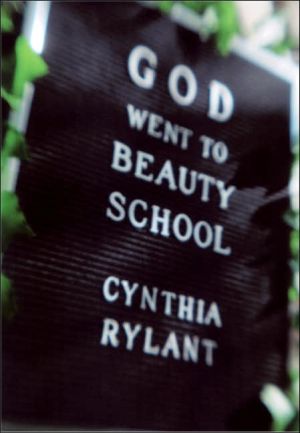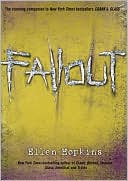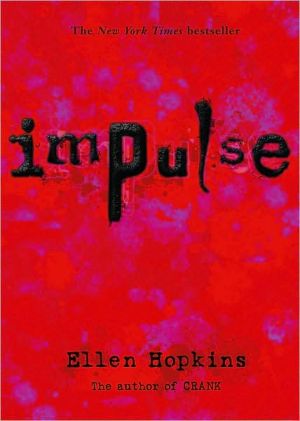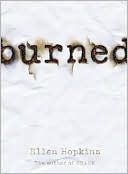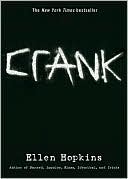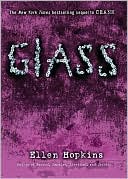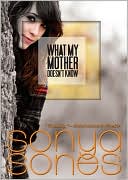God Went to Beauty School
A deeply compelling collection of poems about God and our everyday world from a Newbery medalist.\ Cynthia Rylant takes teens on an invigorating spiritual journey as she explores what God's life on Earth might be like. Rylant's reflective and often humorous verse follows God as he tries out human activities such as getting a dog, writing a fan letter, and making spaghetti.\ God Went to Beauty School combines the awesome with the everyday in an accessible, thought–provoking, and intelligent...
Search in google:
A deeply compelling collection of poems about God and our everyday world from a Newbery medalist.Cynthia Rylant takes teens on an invigorating spiritual journey as she explores what God's life on Earth might be like. Rylant's reflective and often humorous verse follows God as he tries out human activities such as getting a dog, writing a fan letter, and making spaghetti.God Went to Beauty School combines the awesome with the everyday in an accessible, thought–provoking, and intelligent manner.Publishers WeeklyLike Hollywood movies that present God as a human being with curiosities and foibles much like our own, Rylant's imaginative series of poems about God living on earth are filled with more contemporary references than developed theological ideas. Here God buys a sofa at Pottery Barn, gets cable ("Funny thing is,/ He liked it./ He knew He wasn't/ supposed to"), and plays poker with Gabriel ("corn chips all over the place"). Rylant's tone is hip and the voice is compelling. She fills the stylish poems with sly, often comical, religious references, but overall, the narrative favors whimsy over substance. When God opens His own beauty parlor, He calls it "Nails by Jim" because "He was afraid to call it/ Nails by God./ He was sure people would/ think He was being/ disrespectful and using/ His own name in vain/ and nobody would tip." Rylant pushes the envelope of political and theological correctness, in a wink-wink, saucy manner. The poem "God Is a Girl" tells readers that God "wears guy cologne./ He listens to guy music./ He eats guy food./ .../ Which is why,/ whenever He gets the urge/ to watch reruns of Sisters,/ He's embarrassed./ He lights a big cigar/ and spits." Sure to prompt energetic discussion, and not nearly as wickedly subversive as it may at first seem, this book will probably offend religious conservatives unless they have a liberal sense of humor. But Rylant hits the target: teens filled with questions about faith and how they fit into the world. Ages 14-up. (June) Copyright 2003 Reed Business Information.
\ Horn Book Magazine Starred Review“Rylant puts to…use her folksy storytelling skills…and her ability to sincerely extols life’s simple…pleasures and painful losses.”\ \ \ \ \ Horn Book Magazine"Rylant puts to…use her folksy storytelling skills…and her ability to sincerely extols life’s simple…pleasures and painful losses."\ \ \ Publishers WeeklyLike Hollywood movies that present God as a human being with curiosities and foibles much like our own, Rylant's imaginative series of poems about God living on earth are filled with more contemporary references than developed theological ideas. Here God buys a sofa at Pottery Barn, gets cable ("Funny thing is,/ He liked it./ He knew He wasn't/ supposed to"), and plays poker with Gabriel ("corn chips all over the place"). Rylant's tone is hip and the voice is compelling. She fills the stylish poems with sly, often comical, religious references, but overall, the narrative favors whimsy over substance. When God opens His own beauty parlor, He calls it "Nails by Jim" because "He was afraid to call it/ Nails by God./ He was sure people would/ think He was being/ disrespectful and using/ His own name in vain/ and nobody would tip." Rylant pushes the envelope of political and theological correctness, in a wink-wink, saucy manner. The poem "God Is a Girl" tells readers that God "wears guy cologne./ He listens to guy music./ He eats guy food./ .../ Which is why,/ whenever He gets the urge/ to watch reruns of Sisters,/ He's embarrassed./ He lights a big cigar/ and spits." Sure to prompt energetic discussion, and not nearly as wickedly subversive as it may at first seem, this book will probably offend religious conservatives unless they have a liberal sense of humor. But Rylant hits the target: teens filled with questions about faith and how they fit into the world. Ages 14-up. (June) Copyright 2003 Reed Business Information.\ \ \ \ \ KLIATTThe genius of God Went To Beauty School is transparent in the title. It lies in a concept that is at once innocently innovative and obviously classic, the presentation of a very human God, relevant and accessible, One immediately involved in the world He has created. That participation is here presented in a lighthearted and enjoyably familiar manner. This short collection is more clever than deep and is intended as neither a theological primer nor an apology. In fact, fundamentalists might well object to the limitations naturally imposed on a God reflected in contemporary America, One who goes rollerblading, signs up for cable and buys a couch "...from Pottery Barn / and...had a little trouble / because His credit card /billing address didn't match / the delivery address." Yet Rylant's God offers more than an ethical and social commentary on our culture, presenting a Supreme Being Who is empathetic and identifiable to young people. What's more, sophisticated readers will find obvious implications and references to more traditional Christian imagery. "He got into nails, of course, / because He'd always loved / hands--/ hands were some of the best things / He'd ever done." In the situations presented here, somewhat fantastic, God is somehow reminiscent of those Greek and Roman deities whose successes and failures came about through their obvious love of their creation and their consistent attempts to reflect man in their own image, a fundamental Western theological concept. Though not a cornerstone of either a religious or poetic collection, there is a place for this volume on any eclectic and discerning bookshelf. KLIATT Codes: J--Recommended for junior high school students. 2003,HarperCollins, 56p., $4.99.. Ages 12 to 15. \ —James Beschta\ \ \ \ \ VOYAAlthough God wanted "to learn how to give a good perm," He found that He was "just crazy about nails." Believing hands to be His greatest creation, by doing nails He could hold them and examine their intrinsic beauty. After climbing Mount Everest, stunned by the tranquility and awe-inspiring view, God laments not putting everyone there because "nobody'd want to hit the guy next to him on top of Mount Everest." In twenty-three separate verses, God experiences everyday living-gets a dog and a boat, buys a couch, makes spaghetti, becomes a girl-all to become truly "All-Knowing." He sadly and often incredulously puzzles or regrets how His creations have somehow missed His true intent, the humanitarian conduct of life. Finally, more humanized, more approachable, and more vulnerable, God goes back to being God. Rylant packs a powerhouse of parables into this short piece. This reviewer-who is rarely at a loss for words-can hardly find enough to do it justice. Humor is coupled with the not-so-humorous aspects of life, prophetic wisdom with myopic perception, and abstract thought of the mystery of the divinity of God with concrete images of a manlike, flawed being wearing a personal shroud woven of confusion, disappointment, and loss. A basic understanding of biblical scripture is needed to understand the message conveyed. With increasing desire to provide Christian fiction for students, this book is sure to be well received. Even the not-so-religious reader, when reading these achingly beautiful words, cannot help but muse at Rylant's spiritual depth and insight. VOYA CODES: 5Q 4P M J S (Hard to imagine it being any better written; Broad general YA appeal; Middle School, defined as grades 6 to 8;Junior High, defined as grades 7 to 9; Senior High, defined as grades 10 to 12). 2003, HarperCollins, 64p, \ — Cheryl Karp Ward 0060094338\ \ \ \ \ Children's LiteratureCynthia Rylant takes the marvelously warm wit that fills the pages of The Relatives Came and sends God on a tour of the world He created. It is a perfect portrayal of a loving, concerned and caring, literally down-to-earth God. It will be too literal for people who don't want God named or described with any human attributes. Otherwise, younger readers will appreciate how real God becomes: "God went rollerblading./He loved it./He wasn't very good at it./He fell twenty times./ But God always bounces back." Older readers, including adults, will love the whimsy mixed with respect. After He went to beauty school, "God opened up His own shop./He was afraid to call it/Nails by God. He was sure people would think He was being disrespectful and using His own name in vain and nobody would tip." The nails came about, of course, "because He'd always loved hands—hands were some of the best things He'd ever done..." God's tour of earth includes getting a dog, buying a couch, making spaghetti, getting arrested, writing a book ("not that one") and going to the doctor, who notices the skip in His heart (which had started way back, "when He first heard/that some people/didn't believe in Him./It scared Him. Still does.") Cynthia Rylant's poetic perspective on God is filled with exquisite images, touching humor and reverence. 2003, HarperTempest, \ — Karen Leggett\ \ \ \ \ School Library JournalGr 6 Up-What if God was like one of us-someone who went Rollerblading, ate fudge, got a cold? Short, crisp poems pose these questions and answer them with clarity and candor. Copyright 2004 Reed Business Information.\ \ \ \ \ Kirkus ReviewsRylant takes two tropes-God as one of us and God's presence in everything-and turns them into wry and radiant poetry. God goes to beauty school "because He'd always loved hands- / hands were some of the best things / He'd ever done." God buys a couch and makes spaghetti, goes to the doctor and gets arrested, and in each poem Rylant works out with passionate tenderness what that would mean, and how it might tickle the fancy, and that it would tug at our humanity. When God gets a cold, He wants someone to bring Him comic books and juice (Mother Teresa does). When He sees the whole world from the top of Mount Everest and it breaks his heart, "Nobody'd want to hit / the guy next to him / on top of Mount Everest. / 'Next time,' thought God. / 'Next time.' " A wildly imagined concept; Rylant fans as well as thoughtful young readers will be beguiled. (Poetry. 10 )\ \
